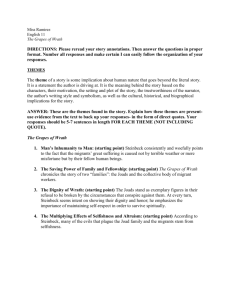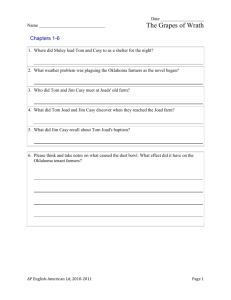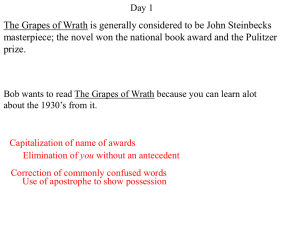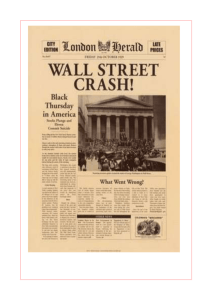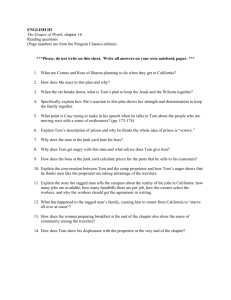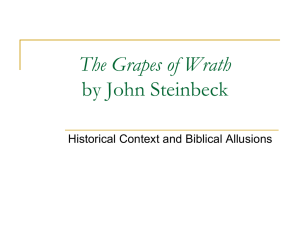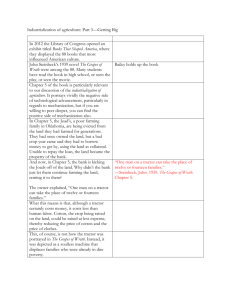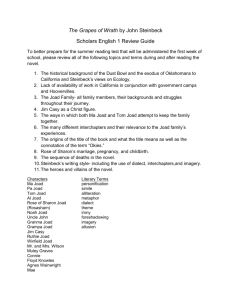Title: The Grapes of Wrath
advertisement
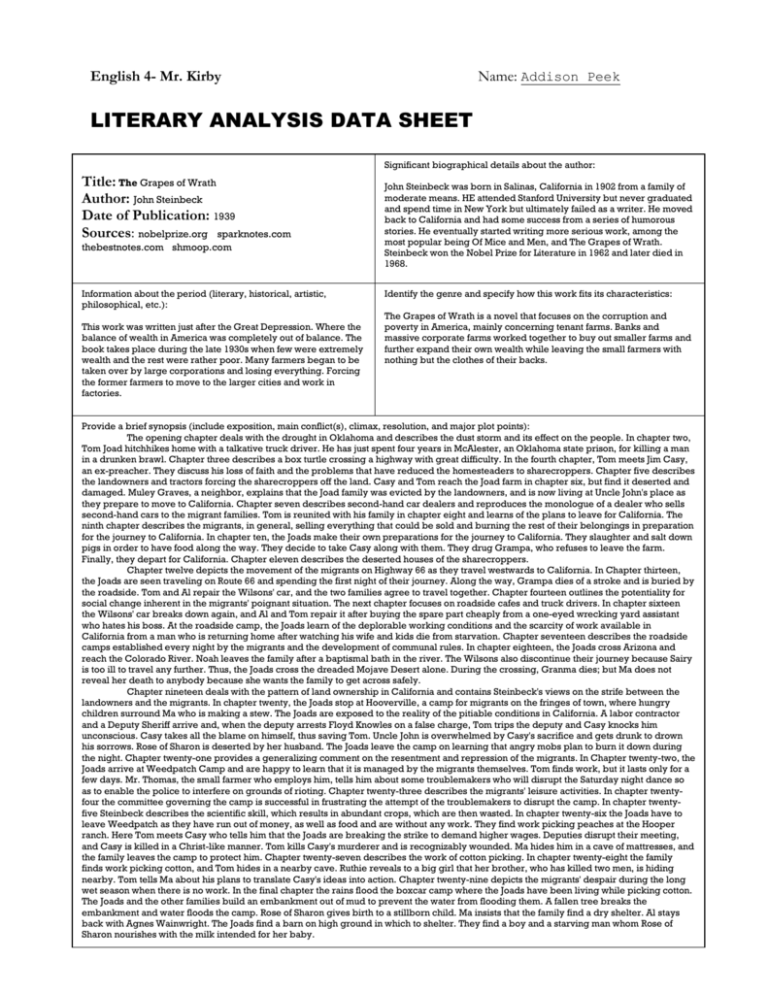
English 4- Mr. Kirby Name: Addison Peek LITERARY ANALYSIS DATA SHEET Significant biographical details about the author: Title: The Grapes of Wrath Author: John Steinbeck Date of Publication: 1939 Sources: nobelprize.org sparknotes.com thebestnotes.com shmoop.com Information about the period (literary, historical, artistic, philosophical, etc.): This work was written just after the Great Depression. Where the balance of wealth in America was completely out of balance. The book takes place during the late 1930s when few were extremely wealth and the rest were rather poor. Many farmers began to be taken over by large corporations and losing everything. Forcing the former farmers to move to the larger cities and work in factories. John Steinbeck was born in Salinas, California in 1902 from a family of moderate means. HE attended Stanford University but never graduated and spend time in New York but ultimately failed as a writer. He moved back to California and had some success from a series of humorous stories. He eventually started writing more serious work, among the most popular being Of Mice and Men, and The Grapes of Wrath. Steinbeck won the Nobel Prize for Literature in 1962 and later died in 1968. Identify the genre and specify how this work fits its characteristics: The Grapes of Wrath is a novel that focuses on the corruption and poverty in America, mainly concerning tenant farms. Banks and massive corporate farms worked together to buy out smaller farms and further expand their own wealth while leaving the small farmers with nothing but the clothes of their backs. Provide a brief synopsis (include exposition, main conflict(s), climax, resolution, and major plot points): The opening chapter deals with the drought in Oklahoma and describes the dust storm and its effect on the people. In chapter two, Tom Joad hitchhikes home with a talkative truck driver. He has just spent four years in McAlester, an Oklahoma state prison, for killing a man in a drunken brawl. Chapter three describes a box turtle crossing a highway with great difficulty. In the fourth chapter, Tom meets Jim Casy, an ex-preacher. They discuss his loss of faith and the problems that have reduced the homesteaders to sharecroppers. Chapter five describes the landowners and tractors forcing the sharecroppers off the land. Casy and Tom reach the Joad farm in chapter six, but find it deserted and damaged. Muley Graves, a neighbor, explains that the Joad family was evicted by the landowners, and is now living at Uncle John's place as they prepare to move to California. Chapter seven describes second-hand car dealers and reproduces the monologue of a dealer who sells second-hand cars to the migrant families. Tom is reunited with his family in chapter eight and learns of the plans to leave for California. The ninth chapter describes the migrants, in general, selling everything that could be sold and burning the rest of their belongings in preparation for the journey to California. In chapter ten, the Joads make their own preparations for the journey to California. They slaughter and salt down pigs in order to have food along the way. They decide to take Casy along with them. They drug Grampa, who refuses to leave the farm. Finally, they depart for California. Chapter eleven describes the deserted houses of the sharecroppers. Chapter twelve depicts the movement of the migrants on Highway 66 as they travel westwards to California. In Chapter thirteen, the Joads are seen traveling on Route 66 and spending the first night of their journey. Along the way, Grampa dies of a stroke and is buried by the roadside. Tom and Al repair the Wilsons' car, and the two families agree to travel together. Chapter fourteen outlines the potentiality for social change inherent in the migrants' poignant situation. The next chapter focuses on roadside cafes and truck drivers. In chapter sixteen the Wilsons' car breaks down again, and Al and Tom repair it after buying the spare part cheaply from a one-eyed wrecking yard assistant who hates his boss. At the roadside camp, the Joads learn of the deplorable working conditions and the scarcity of work available in California from a man who is returning home after watching his wife and kids die from starvation. Chapter seventeen describes the roadside camps established every night by the migrants and the development of communal rules. In chapter eighteen, the Joads cross Arizona and reach the Colorado River. Noah leaves the family after a baptismal bath in the river. The Wilsons also discontinue their journey because Sairy is too ill to travel any further. Thus, the Joads cross the dreaded Mojave Desert alone. During the crossing, Granma dies; but Ma does not reveal her death to anybody because she wants the family to get across safely. Chapter nineteen deals with the pattern of land ownership in California and contains Steinbeck's views on the strife between the landowners and the migrants. In chapter twenty, the Joads stop at Hooverville, a camp for migrants on the fringes of town, where hungry children surround Ma who is making a stew. The Joads are exposed to the reality of the pitiable conditions in California. A labor contractor and a Deputy Sheriff arrive and, when the deputy arrests Floyd Knowles on a false charge, Tom trips the deputy and Casy knocks him unconscious. Casy takes all the blame on himself, thus saving Tom. Uncle John is overwhelmed by Casy's sacrifice and gets drunk to drown his sorrows. Rose of Sharon is deserted by her husband. The Joads leave the camp on learning that angry mobs plan to burn it down during the night. Chapter twenty-one provides a generalizing comment on the resentment and repression of the migrants. In Chapter twenty-two, the Joads arrive at Weedpatch Camp and are happy to learn that it is managed by the migrants themselves. Tom finds work, but it lasts only for a few days. Mr. Thomas, the small farmer who employs him, tells him about some troublemakers who will disrupt the Saturday night dance so as to enable the police to interfere on grounds of rioting. Chapter twenty-three describes the migrants' leisure activities. In chapter twentyfour the committee governing the camp is successful in frustrating the attempt of the troublemakers to disrupt the camp. In chapter twentyfive Steinbeck describes the scientific skill, which results in abundant crops, which are then wasted. In chapter twenty-six the Joads have to leave Weedpatch as they have run out of money, as well as food and are without any work. They find work picking peaches at the Hooper ranch. Here Tom meets Casy who tells him that the Joads are breaking the strike to demand higher wages. Deputies disrupt their meeting, and Casy is killed in a Christ-like manner. Tom kills Casy's murderer and is recognizably wounded. Ma hides him in a cave of mattresses, and the family leaves the camp to protect him. Chapter twenty-seven describes the work of cotton picking. In chapter twenty-eight the family finds work picking cotton, and Tom hides in a nearby cave. Ruthie reveals to a big girl that her brother, who has killed two men, is hiding nearby. Tom tells Ma about his plans to translate Casy's ideas into action. Chapter twenty-nine depicts the migrants' despair during the long wet season when there is no work. In the final chapter the rains flood the boxcar camp where the Joads have been living while picking cotton. The Joads and the other families build an embankment out of mud to prevent the water from flooding them. A fallen tree breaks the embankment and water floods the camp. Rose of Sharon gives birth to a stillborn child. Ma insists that the family find a dry shelter. Al stays back with Agnes Wainwright. The Joads find a barn on high ground in which to shelter. They find a boy and a starving man whom Rose of Sharon nourishes with the milk intended for her baby. Literary Analysis Data Sheet page 2 Identify and explain the use and effect of three literary techniques: Cite and quote one example of each: 1. "Just Jim Casy now. Ain't got the call no more. Got a lot of sinful idears – but they seem kinda sensible." (Chapter 2) Casy seems to fight against the black-and-white, good-or-bad nature of religion. He likes to swim in the grey areas in between. 1. Biblical Allusions 2. Symbolism of the grapes Steinbeck uses the grapes as symbols of plenty. The grapes correspond to the cluster of grapes which Joshua and Oshea bring back from their first trip into the rich land of Canaan as told in The Bible. Grampa alludes to this meaning of the grapes when he says that he is going to sit in a tub full of grapes in California. 2. "In the daylight [the migrant people] scuttled like bugs to the westward; and as the dark caught them, they clustered like bugs near to shelter and to water...But along the highway the cars of the migrant people crawled out like bugs..."(Chapter 17) This describes the need of the people to seek out the companionship of other families like themselves, where they were able to find a sense of camaraderie and community. Significant Quotes Cite and quote three significant passages: 1. We can't depend on it. The bank – the monster – has to have profits all the time. It can't wait. It'll die. No, taxes go on. When the monster stops growing, it dies. It can't stay one size. (5.11) Explain the significance of each passage or explain how it relates to the work as a whole: 1. By attributing blame to a monster, to an inhuman thing, it makes it easier for the landowners to do inhuman things. 2. What do you want us to do? We can't take less share of the crop – we're half starved now. The kids are hungry all the time. We got no clothes, torn an' ragged. If all the neighbors weren't the same, we'd be ashamed to go to meeting. (5.13) 2. The tenant farmers try to reason to the landowners. There's no money to be had anywhere in the community. Everyone is down and out. If everyone is down and out, it's no one particular family's fault. There's a larger problem that can't be blamed on the individual tenant families 3. "Times are changed, don't you know? Thinking about stuff like that don't feed the kids. Get your three dollars a day, feed your kids. You got no call to worry about anybody's kids but your own. You get a reputation for talking like that, and you'll never get three dollars a day if you worry about anything but your three dollars a day." (5.53) 3. How exactly have times changed? The tractor driver indicates that "modern" America is one that favors the individual over the community. 4. [a disgruntled migrant worker:] "Fella in business got to lie an' cheat, but he calls it somepin else. You go steal that tire an' you're a thief, but he tried to steal your four dollars for a busted tire. They call that sound business." (12.31) 4. What do you call the business of selling a busted tire for four dollars? Sound business or robbery? 5. [Tom Joad:] "Oh, awright. You eat regular, 5. Prison sounds glorious compared to the dismal places that the Joads must live. In fact, it almost seems like Weedpatch. an' get clean clothes, and there's places to take a bath. It's pretty nice some ways. Makes it hard not havin' no women […] They was a guy paroled," he said. "'Bout a month he's back for breakin' parole. A guy ast him why he bust this parole. 'Well, hell,' he says. 'They got no conveniences at my old man's place. Got no 'lectric lights, got no shower baths. There ain't no books, an' the food's lousy.'" (4.67) Literary Analysis Data Sheet page 3 Characters Record information for each significant major character in the work Name Role in the story Significance or Purpose Adjectives 1. Tom Joad 1. Protagonist 1. Even though he killed a man and has been separated from his family for four years, he does not waste his time with regrets. He lives fully for the present moment, which enables him to be a great source of vitality for the Joad family. A wise guide and fierce protector, Tom exhibits a moral certainty throughout the novel that imbues him with strength and resolve: he earns the awed respect of his family members as well as the workers he later organizes into unions. 1. good natured and thoughtful, ex con 2. Ma Joad 2. Tom's mother 2. Ma is introduced as a woman who knowingly and gladly fulfills her role as “the citadel of the family.” She is the healer of the family’s ills and the arbiter of its arguments, and her ability to perform these tasks grows as the novel progresses. 2. comforting and helpful 3. Pa Joad 3. Tom's father 3. a Joad is an Oklahoma tenant farmer who has been evicted from his farm. A plainspoken, good-hearted man, Pa directs the effort to take the family to California. Once there, unable to find work and increasingly desperate, Pa finds himself looking to Ma Joad for strength and leadership, though he sometimes feels ashamed of his weaker position. 3. goodhearted and plainspoken 4. Moral voice of novel 4. A former preacher who gave up his ministry out of a belief that all human experience is holy. Often the moral voice of the novel, Casy articulates many of its most important themes, among them the sanctity of the people and the essential unity of all mankind. A staunch friend of Tom Joad, Casy goes to prison in Tom’s stead for a fight that erupts between laborers and the California police. He emerges a determined organizer of the migrant workers 4. staunch friend 4. Jim Casy 5. Rose of Sharon 5. Jane’s close friend at the Lowood School 5. The oldest of Ma and Pa Joad’s daughters, and Connie’s wife. An impractical, petulant, and romantic young woman, Rose of Sharon begins the journey to California pregnant with her first child. She and Connie have grand notions of making a life for themselves in a city. The harsh realities of migrant life soon disabuse Rose of Sharon of these ideas, however. Her husband abandons her, and her child is born dead. By the end of the novel, she matures considerably, and possesses, the reader learns with surprise, something of her mother’s indomitable spirit and grace. 5. impractical petulant and romantic 6. Connie 6. Husband of Rose of Sharon 6. Rose of Sharon’s husband, Connie is an unrealistic dreamer who abandons the Joads after they reach California. This act of selfishness and immaturity surprises no one but his naïve wife. 6. unrealistic and immature Literary Analysis Data Sheet page 4 Describe the setting(s) and explain its/their significance: Identify and explain the theme(s) of the work: The territory of The Grapes of Wrath is of epic proportions and is described in great detail. The setting includes a large part of Oklahoma, portions of other states, and a large area of California. The early narrative chapters focus on land near Sallisaw, in the eastcentral part of Oklahoma. The westward journey of the Joad family covers some eighteen hundred miles through portions of seven states: Texas, Oklahoma, Kansas, Arkansas, New Mexico, and California. The huge territory covered in chapters twelve to eighteen is described in great detail. Steinbeck lists names of places, state roads, and highways, as well as describing the national Highway 66, "the path of a people in flight," and the main route westward. The poetic descriptions of the land through which Highway 66 passes create a sense of expansiveness and spaciousness. Man's inhumanity to Man: Steinbeck consistently and woefully points to the fact that the migrants’ great suffering is caused not by bad weather or mere misfortune but by their fellow human beings. Historical, social, and economic circumstances separate people into rich and poor, landowner and tenant, and the people in the dominant roles struggle viciously to preserve their positions. In his brief history of California in Chapter 19, Steinbeck portrays the state as the product of land-hungry squatters who took the land from Mexicans and, by working it and making it produce, rendered it their own. Now, generations later, the California landowners see this historical example as a threat, since they believe that the influx of migrant farmers might cause history to repeat itself. In order to protect themselves from such danger, the landowners create a system in which the migrants are treated like animals, shuffled from one filthy roadside camp to the next, denied livable wages, and forced to turn against their brethren simply to survive. The novel draws a simple line through the population—one that divides the privileged from the poor—and identifies that division as the primary source of evil and suffering in the world. Identify and explain key metaphors, symbols, or motifs: According to Steinbeck, many of the evils that plague the Joad family and the migrants stem from selfishness. Simple self-interest motivates the landowners and businessmen to sustain a system that sinks thousands of families into poverty. In contrast to and in conflict with this policy of selfishness stands the migrants’ behavior toward one another. Aware that their livelihood and survival depend upon their devotion to the collective good, the migrants unite—sharing their dreams as well as their burdens—in order to survive. Throughout the novel, Steinbeck constantly emphasizes self-interest and altruism as equal and opposite powers, evenly matched in their conflict with each other. In Chapters 13 and 15, for example, Steinbeck presents both greed and generosity as self-perpetuating, following cyclical dynamics. In Chapter 13, we learn that corporate gas companies have preyed upon the gas station attendant that the Joads meet. The attendant, in turn, insults the Joads and hesitates to help them. Then, after a brief expository chapter, the Joads immediately happen upon an instance of kindness as similarly selfpropagating: Mae, a waitress, sells bread and sweets to a man and his sons for drastically reduced prices. Some truckers at the coffee shop see this interchange and leave Mae an extra-large tip. When the novel begins, the Joad family relies on a traditional family structure in which the men make the decisions and the women obediently do as they are told. So invested are they in these roles that they continue to honor Grampa as the head of the family, even though he has outlived his ability to act as a sound leader. As the Joads journey west and try to make a living in California, however, the family dynamic changes drastically. Discouraged and defeated by his mounting failures, Pa withdraws from his role as leader and spends his days tangled in thought. In his stead, Ma assumes the responsibility of making decisions for the family. At first, this shocks Pa, who, at one point, lamely threatens to beat her into her so-called proper place. The threat is empty, however, and the entire family knows it. By the end of the novel, the family structure has undergone a revolution, in which the woman figure, traditionally powerless, has taken control, while the male figure, traditionally in the leadership role, has retreated. This revolution parallels a similar upheaval in the larger economic hierarchies in the outside world. Thus, the workers at the Weedpatch camp govern themselves according to their own rules and share tasks in accordance with notions of fairness and equality rather than power-hungry ambition or love of authority. The saving power of family and friendship: The Grapes of Wrathchronicles the story of two “families”: the Joads and the collective body of migrant workers. Although the Joads are joined by blood, the text argues that it is not their genetics but their loyalty and commitment to one another that establishes their true kinship. In the migrant lifestyle portrayed in the book, the biological family unit, lacking a home to define its boundaries, quickly becomes a thing of the past, as life on the road demands that new connections and new kinships be formed. The reader witnesses this phenomenon at work when the Joads meet the Wilsons. In a remarkably short time, the two groups merge into one, sharing one another’s hardships and committing to one another’s survival. This merging takes place among the migrant community in general as well: “twenty families became one family, the children were the children of all. The loss of home became one loss, and the golden time in the West was one dream.” In the face of adversity, the livelihood of the migrants depends upon their union. As Tom eventually realizes, “his” people are all people. Write at least three questions or topics for class discussion: 1. What is Jim Casy’s role in the novel? How does his moral philosophy govern the novel as a whole? 2. Many critics have noted the sense of gritty, unflinching realism pervading The Grapes of Wrath. How does Steinbeck achieve this effect? Do his character portrayals contribute, or his description of setting, or both? 3. Half of the chapters in The Grapes of Wrath focus on the dramatic westward journey of the Joad family, while the others possess a broader scope, providing a more general picture of the migration of thousands of Dust Bowl farmers. Discuss this structure. Why might Steinbeck have chosen it? How do the two kinds of chapters reinforce each other?
